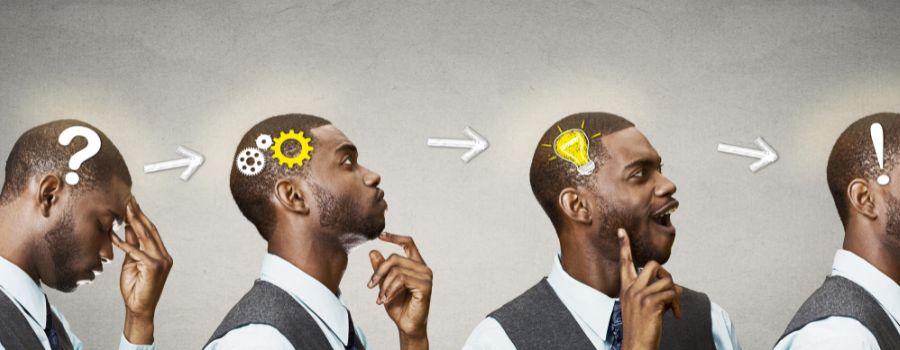The beginning of EI
The concept of emotional intelligence (EI) first emerged with Charles Darwin, who noted the importance of emotional expression for people’s survival and adaptation.
Over the years, several theorists and researchers, such as Edward Thorndike, David Wechsler, and Abraham Maslow, among others, have gone deeper into the theory and perfected the concept.
In 1990, Peter Salovey and John D. Mayer published an article so incredible and of great worldwide impact, that from then on, it really started to become known and to talk about emotional intelligence.
They defined Emotional Intelligence as: “(…) the ability to perceive and express emotion, assimilate it to thought, understand and reason with it, and know how to adjust it in oneself and in others.”
In his book “Emotional Intelligence”, Daniel Goleman (1995) starts with scientific research to affirm that the control of emotions contributes in an essential way to the development of the individual’s intelligence.
This thesis reveals that the inability to deal with our own emotions can hinder or even destroy our lives.
The author points out that the crisis that humanity is experiencing today, with an increase in crime, violence and unhappiness, is the reflection of a culture that was only concerned with the intellect, forgetting the emotional side of people.
Today, Emotional Intelligence is a great differential and is becoming increasingly necessary both in personal and professional life.
Daniel Goleman, states that emotional intelligence can be subdivided into five specific skills, better known as the pillars of emotional intelligence, they are:
-
Self-knowledge:
First of all, remember that this pillar is the first step that will determine the course for the next steps.
Therefore, seek self-knowledge, investigate your actions and reactions, and always be very sincere with yourself.
Only then will it be possible to evaluate your skills and points to be improved.
Try to understand how you react in each situation, what you feel and how you could act differently if you realize you need to change.
-
Emotional control/balance
This is the keyword in this step because we can find control over our actions if we know ourselves well if we can anticipate decisions based on our emotions, that is, we can also call it self-management.
In this way, you avoid unnecessary outbursts that may lead to later regrets, it helps you to manage your impulses, each one of them so that you are able to adapt to the different situations that arise in your daily life.
-
Self-motivation
Getting up religiously every day to work and not having the motivation to carry out your tasks is one of those painful sacrifices, isn’t it? After all, why dedicate your time to purposes that apparently don’t have a greater purpose and don’t arouse your interest?
Motivation serves as a purpose for action, for moving towards the goal one intends to achieve.
Only with this well defined in your mind will you acquire the strength to overcome obstacles and uncertainties, so you will be able to stay focused, which is essential to not get distracted and discouraged when the first difficulties arise.
A life without motivation, where one easily gives in to challenges and gets carried away by a purposeless routine, will eventually lead to depression.
To avoid this bumpy road to nowhere, be sure of your goal and build a positive path towards it.
-
Empathy
When you understand a person and respect their way of seeing the world, you can create harmony and connection with them, this is empathy. It means looking at the other, that is, the ability to put yourself in the other’s shoes and feel what the other feels.
This ability to understand generates quality in relationships and is fundamental for every individual whose mission is to help people and build a better world in which to live.
In short, establishing empathy is one of the most important skills a person can have, as it is about understanding the emotional structure of other people.
-
Develop interpersonal relationships (social skills)
No one lives isolated on an island, so we need to interact with other people, often completely different from us, so it’s crucial that we understand how close people feel and behave, this helps to strengthen our Emotional Intelligence.
At this point in your emotional development, you will certainly come across difficult people who can destabilize the environment, preferring to challenge the state of things gratuitously, without any positive objective.
Know that this is the most decisive moment for you to apply what you have learned, putting your Emotional Intelligence to the test.
The importance of EI
Developing Emotional Intelligence will make habits that are already ingrained that harm you reviewed and eliminated, so that you can create new habits, already under a new perspective of life.
A person with low emotional intelligence usually faces problems that inevitably affect their relationships and hinder their growth and the development of a healthy life in every way.
The characteristics of someone who does not have control over their emotions include not recognizing their weaknesses, mistrust of their own feelings, inability to understand others, inconstancy and lack of goal development.
In conclusion, we cannot master the feelings that come to us, but we can transform them.
We need to learn to manage our feelings so that we don’t lose our balance.
A negative feeling can only bring bad consequences, so you have to train your emotions to withstand the worst feelings without being dominated by them.
Don’t sabotage your journey in pursuit of your goals, managing your emotions is something essential to do every day!
Seek emotional intelligence, because through you, people improve, things improve, problems are solved, and environments become lighter.









